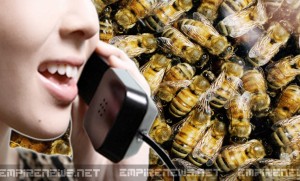A Russian whistleblower has spilled the beans on another planned invasion of Ukraine by Russian forces, this time aided by a specially trained and bred species of attack bees.
The ‘Russianized’ bees were housed and trained in what the informant described as “anger hives,” specially constructed to keep the bees constantly agitated and ready for attack.
Through a translator he said, “We interrupted the bees’ sleep and work cycles and sometimes would poke the anger hives with sticks and broom handles. At first we were not given adequate protection to keep us from getting bee stings, and one of our workers had to be hospitalized after he accidentally tipped over one of the bee boxes. I was stung only a few times, but my friend was stung many hundreds of times.”
After the February 14 Ukrainian Revolution, Russia stepped up hardline efforts to re-establish control in the troubled region. Special military forces annexed Crimea, an act that Russian President Vladimir Putin reluctantly admitted after many international inquiries for answers.
It is unclear whether the worldwide collapse of bee populations is connected with Russian bee recruitment efforts, although the unnamed informant did provide some clues as to how the bees were obtained.
“We were ordered to plant many special fields of clover and other plant and flowers that would attract the bees. These orders came directly from President Putin. We sprayed the plants with synthetic bee hormones to attract them, and then with smoke machines and nets we were able to calm and capture them for the hives.”
As for the ‘training,’ it was explained that following the bees’ capture, the anger hives were placed in a greenhouse type structure where they were exposed to bright lights 24 hours a day, with loud ‘Ukrainian style’ music played throughout the day. Teams of ‘box bangers’ were also recruited to agitate the bees. The box bangers would rhythmically hit the hives with sticks at pre-determined times during the day at pre-set intervals timed to coincide with specific musical passages. It was believed that this schedule provided a command structure for the bees, thus making them easier to attack when triggered by the replay of the musical selection.
Russian authorities have denied the story. A spokesman for the Russian military said the charges come from “the delusions of an ex-member of our forces who received what you would call a dishonorable discharge. These absolutely ridiculous rumors came from an individual labeled a misfit. He could not withstand the rigors and discipline of military training.”
At present, it is unclear if bee recruitment and training did progress to the level explained by the informant, as no physical evidence can be found of either the fields used to attract the bees, or the anger hive structures.
“That is not surprising,” said the informant. “Why would they admit such a thing? I saw it with my own eyes and have several bee-stings to prove what I saw is true. Someday the world will know that I am not a crazy person and that I speak the truth,” he added.






























